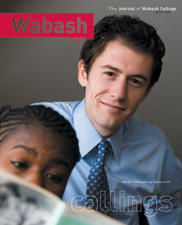Hats off to "Straddlers"
After searching the word "straddlers" online I found the article that WM published by Alfred Lubrano (A Man’s Life, WM Fall 2004). I have read Lubrano’s book on the same subject and agree with his assessment [of those of us who move from blue- to white-collar in a single generation]. I can safely say that I am such a straddler!
Hats off to you for publishing this work.
—Dan Proctor, Richmond, VA
Wild Summer
Director of Sports Information Brent Harris did great work on the recent article about senior Mark Server’s internship with us in Alaska ("Wild Summer," WM Winter 2006). When I created our internship here at the Cook Inlet Aquaculture Association I had one school in mind—Wabash College. Mark did an excellent job for us this past summer, and it really pleases me to see him pass his experience along to alumni and current students alike. And the fact that the article appears in the sports section (I’m a former Little Giant football player) was the icing on the cake.
I’ve already been in contact with Professor [David] Polley concerning future intern prospects. I look forward to providing Wabash men an opportunity to broaden their studies and perspectives on a "Great Land" that many do not get the opportunity to witness first hand.
—Trent Dodson ’98
CIAA Senior Biologist, Cook Inlet, AK
The view from the street
 I just finished reading the article about Jeremy Robinson ’04 ("A Stand Against Despair," WM Winter 2006) and his work in the Englewood community. I have been a police officer for nine years (five as a gang/narcotics detective) and was a high school substitute teacher for one year, and I have worked six cases for my suburban police department in the Englewood area.
I just finished reading the article about Jeremy Robinson ’04 ("A Stand Against Despair," WM Winter 2006) and his work in the Englewood community. I have been a police officer for nine years (five as a gang/narcotics detective) and was a high school substitute teacher for one year, and I have worked six cases for my suburban police department in the Englewood area.
From that perspective, I noticed a few things in the article that others might have missed:
—The male juvenile in the upper left hand corner of the opening photo is throwing gang signs promoting the "Brothers of the Struggle"—the Black Gangster Disciples, one of the largest street gangs in Chicago.
—Mr. Robinson calls Englewood "a weird environment," and he’s right. You come to realize that after working in that community as a police officer; you understand what they are going through when it comes to the gangs, drug trade, prostitution, and how it affects the children.
 — The article describes the freshmen at the high school as "dangerous." They can be. These kids know the law treats them as juveniles and they’ll be given lighter punishment or probation for any criminal acts they commit against a teacher or a school. They gain experience and knowledge as juveniles by violating the laws and committing horrible acts against people. When they become adults, they know the drill and how to avoid stiffer punishment. I know parents who are gang members and have their kids brought into the gangs as early as age eight.
— The article describes the freshmen at the high school as "dangerous." They can be. These kids know the law treats them as juveniles and they’ll be given lighter punishment or probation for any criminal acts they commit against a teacher or a school. They gain experience and knowledge as juveniles by violating the laws and committing horrible acts against people. When they become adults, they know the drill and how to avoid stiffer punishment. I know parents who are gang members and have their kids brought into the gangs as early as age eight.
— Skinny Mini, the young lady mentioned in the article, is probably a nice girl; but on the street, no one goes by their real name. In five years of gang work, I have dealt with people with street names like Grumpy, T-Bone, Doo Solid, Mud Head, etc. I helped solve three gang-related homicides based on street names alone. Heck, I have my own street names given by cops and gang members. The cops call me "Rain Man" for my memory, and the gangs have a different name depending on which gang we are dealing with!
If you are interested in an article from the perspective of a substitute-teacher-turned-cop, just let me know.
—Garrick Yurgil ’96, Elgin, IL
We hope to include Garrick’s work in a future issue of WM.
"Rumors of my demise"
 An email from Greg Castanias ’87 in February carried an editor’s nightmare: "For a fellow who died of cancer in December 2004, Larry Blount looks awfully good these days!"
An email from Greg Castanias ’87 in February carried an editor’s nightmare: "For a fellow who died of cancer in December 2004, Larry Blount looks awfully good these days!"
Greg was referring to a typo in our WM Winter 2006 article about the formation of the Capitol Association of Wabash Men. A sentence that was to have read:
"Jim was the one who took the initiative, who promoted it, and sustained it in its first several years," says Larry Blount of Graham, who died of cancer in 2004.
Was "corrected" during the proofing process to:
"Jim was the one who took the initiative, who promoted it, and sustained it in its first several years," says Larry Blount, who died of cancer in 2004.
And the editor missed the typo! What’s worse, I did so in the section of the article that featured Larry’s good friend Jim Graham ’65, to whom Larry paid such eloquent tribute at the 2005 Big Bash.
Those from the Class of 65 who attended that Big Bash know a further irony of this error: Larry was diagnosed with cancer in July 2004. At the Class of 65 Reunion last June, he told his classmates that when Jim Graham, then terminal, heard that Larry had cancer, he gave him a "Wabash Always Fights" refrigerator magnet that he’d kept during his own battle with the disease.
Cancer-free by the time of the reunion, Larry passed that magnet along to his class agents, to be given anyone else in the Class of 65 who finds himself facing that battle.
Larry was kind enough to accept my apology and, as you can see here, is doing just fine (that’s him kneeling, lower right, in the photo I took of the Capitol Association when I visited them in October 2005).
Photo: Larry Blount (lower right) with his fellow DC-area Wabash men and Professor Melissa Butler in october 2005.
Hooked by "The Fish"?
In the media frenzy surrounding writer James Frey’s confession on The Oprah Winfrey Show that parts of his memoir were fictitious, a lesser-known but equally troubling scandal was nearly overlooked. The L.A. Weekly reported that Nasdijj, the award-winning author of The Blood Runs Like a River Through My Dreams, was not the son of an alcoholic father and a Navajo mother, as he had claimed in that book, but was in fact
Tim Barrus, the son of middle-class parents of Scandinavian descent. Barrus admits the deception in the May 2006 issue of Esquire—the magazine which first published Nasdijj in 1999.
Carol Schneider, vice president at Random House, another of Nasdijj’s publishers, said, "We are very distressed to have published two memoirs that appear to be deliberately inaccurate. It’s fair to say the whole publishing industry is struggling with issues of authenticity in memoir, ourselves included."
WM readers may recall Nasdijj as the author of the Fall 2005 A Man’s Life essay "The Fish," which described the struggles of boys with AIDS and the support group and counseling the author provides for them. We selected the piece because it shed light on the plight of children with HIV/AIDS and depicted the author as a fiercely independent man attempting to live humanely in a difficult world. "The Fish" dealt only tangentially with the author’s Native American identity. Yet in claiming to be someone he is not, Barrus casts doubt on every word he’s ever written—doubt that could lead some to dismiss the very worthy cause for which he was an advocate in his A Man’s Life essay.
"My work with boys with AIDS is real," the author responded when asked if the events described in "The Fish" are true. "But I am not writing about it [anymore]. I have to end that. It puts minors under a scrutiny they do not deserve. To be associated with me is poison."
WM publishes the A Man’s Life essay to illuminate, enrich, and inform the Wabash community. As editor, I am determined to do a better job ensuring the veracity of that information and our guest authors.
Read more at "Hooked by 'The Fish'" at WM Online.